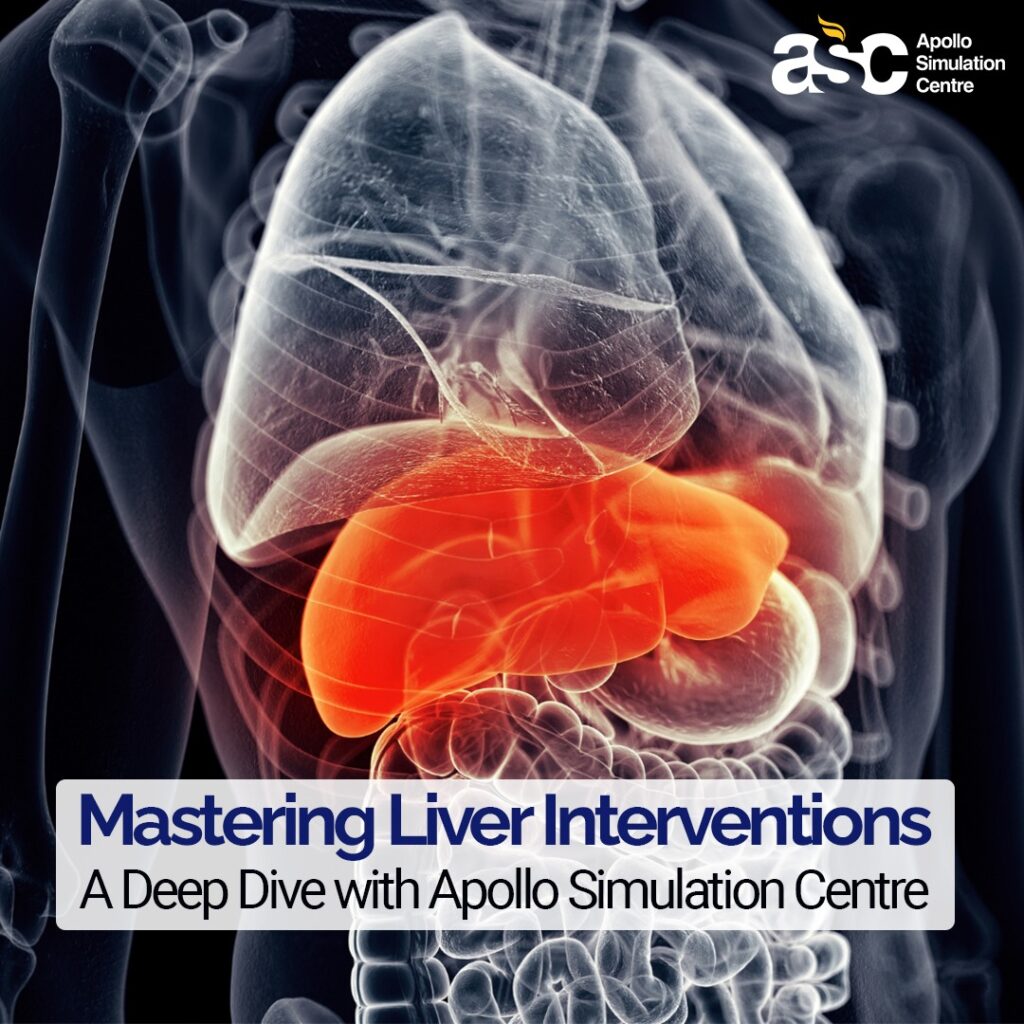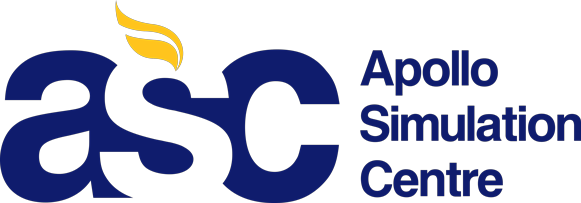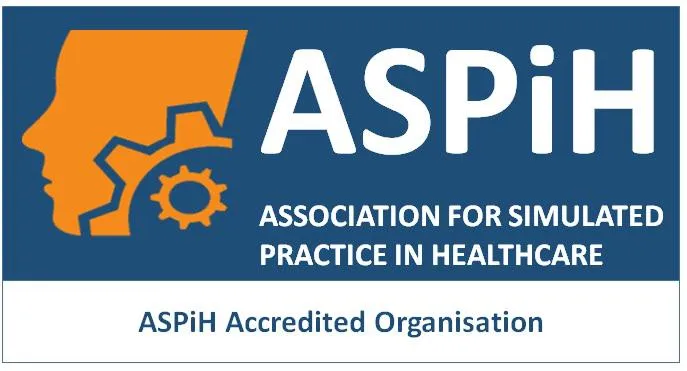Liver interventions, a critical area of modern medicine, play an essential role in diagnosing and treating various hepatic conditions. It is estimated that liver disease is responsible for over 2 million deaths globally each year, with conditions such as cirrhosis and liver cancer being leading causes. The growing burden of liver diseases highlights the urgent need for healthcare professionals to be proficient in performing precise, safe, and effective liver interventions. The Apollo Simulation Centre, with its advanced training programme, offers an invaluable opportunity for clinicians to enhance their skills in liver interventions through high-fidelity simulations that combine technical training with a comprehensive understanding of liver pathology and management.

The Significance of Liver Interventions
Liver interventions have become increasingly important with the rise of liver diseases, many of which require intricate procedures to manage or treat effectively. Procedures such as liver biopsies, tumour ablations, and catheter drainages require precision and technical expertise, as well as an in-depth knowledge of liver anatomy and pathology. Moreover, managing liver diseases such as hepatocellular carcinoma (HCC), the most common form of liver cancer, demands more than just medical treatment; it requires timely, well-executed interventions to prevent further complications.
In this context, Apollo Simulation Centre’s liver intervention course stands out as a crucial resource for healthcare professionals. By focusing on ultrasound-guided liver procedures, the course equips participants with both the technical and cognitive skills necessary to perform minimally invasive procedures. The simulation-based approach ensures that clinicians are not only capable of performing interventions but also adept at managing potential complications that may arise during and after the procedures.
Apollo Simulation Centre’s Liver Intervention Training: A Holistic Approach
The Liver Intervention training programme at Apollo Simulation Centre is designed to cater to a wide range of healthcare professionals, from radiologists to hepatologists and surgeons. The course structure is methodical, with a focus on both theoretical and hands-on learning, ensuring that participants are well-versed in all aspects of liver interventions.
The course begins with an in-depth exploration of liver anatomy and pathology, helping participants gain a thorough understanding of the underlying conditions that necessitate interventions. This foundational knowledge is critical, as a precise understanding of the liver’s complex vascular and biliary systems is essential for successful intervention procedures.
Key Components of the Training
- Ultrasound Proficiency: One of the standout features of the programme is the emphasis on ultrasound-guided procedures. Ultrasound is the cornerstone of liver interventions, providing real-time imaging that guides clinicians during biopsies, ablations, and drainage procedures. Participants receive intensive training in interpreting ultrasound images and using them to navigate instruments accurately to the site of intervention.According to a study published in the Journal of Hepatology, ultrasound-guided liver biopsy has a success rate of over 95% when performed by skilled clinicians, significantly reducing the risk of complications. The simulation centre integrates this knowledge into the training, allowing participants to practise ultrasound techniques using high-fidelity mannequins that mimic real-life liver pathologies.
- Biopsy and Drain Placement: Liver biopsies are fundamental for diagnosing conditions like liver cirrhosis, HCC, and other liver pathologies. The ability to safely and accurately obtain a tissue sample is crucial in formulating a treatment plan. Apollo’s programme ensures that participants are proficient in performing biopsies using ultrasound guidance, thereby minimising risks such as bleeding or infection.Similarly, the placement of catheters for draining fluid from the liver or surrounding tissues is another critical procedure taught during the training. Whether dealing with ascites or liver abscesses, proper drain placement is essential for improving patient outcomes. Participants engage in multiple simulation scenarios that allow them to practise these interventions repeatedly, building their confidence and technical competence.
- Tumour Ablation Techniques: Radiofrequency and microwave ablations are increasingly being used to treat liver tumours, especially in patients with early-stage HCC who are not candidates for surgery. These techniques rely on precision, as missteps can lead to complications like thermal injury to surrounding tissues. Apollo Simulation Centre’s programme includes comprehensive training in these ablation techniques, with participants learning to position electrodes accurately and monitor the ablation process to ensure tumour destruction.The programme integrates the latest advancements in ablation technology, providing participants with up-to-date knowledge on how to leverage these techniques for optimal patient outcomes. A study in The Lancet Oncology showed that radiofrequency ablation has a tumour recurrence-free survival rate of 80% at three years, highlighting the importance of proper training in these procedures.
- Managing Complications: No medical procedure is without risks, and liver interventions are no exception. Bleeding, infection, and organ injury are potential complications that can arise during these procedures. The Apollo Simulation Centre places significant emphasis on teaching participants how to anticipate, identify, and manage complications in real time. Through simulated emergency scenarios, participants learn to make quick, informed decisions that can prevent or mitigate complications, ultimately improving patient safety and outcomes.
Bridging Theory and Practice: The Role of Simulation
The Apollo Simulation Centre’s liver intervention course bridges the gap between theoretical knowledge and real-world application. While theoretical modules cover essential topics such as liver anatomy, pathology, and the principles of ultrasound guidance, the true strength of the programme lies in its hands-on simulation training.
High-fidelity simulators replicate a range of liver pathologies, from benign cysts to malignant tumours, allowing participants to practise complex interventions in a safe, controlled environment. This approach ensures that participants can make mistakes, learn from them, and refine their skills without risking patient safety.
Real-World Application and Improved Patient Outcomes
Ultimately, the goal of the Apollo Simulation Centre’s liver intervention programme is to improve patient outcomes. By equipping healthcare professionals with the skills and confidence to perform complex liver procedures, the programme directly contributes to reducing the morbidity and mortality associated with liver diseases.
Participants who complete the programme are better prepared to offer timely, accurate, and safe interventions, whether it is diagnosing liver conditions through biopsy or treating tumours with ablation. Their ability to manage complications effectively also ensures that patients receive the best possible care.
Pre- and Post-Procedural Management
In addition to technical skills, the course covers comprehensive patient care, from pre-procedural planning to post-procedural management. Understanding how to prepare patients for liver interventions, as well as how to monitor and manage their recovery, is critical for improving outcomes. Apollo Simulation Centre’s holistic approach ensures that participants leave with a well-rounded understanding of both the technical and patient-care aspects of liver interventions.
Expanding Liver Care Horizons With Liver Interventions
The Apollo Simulation Centre’s liver intervention course is a vital resource for healthcare professionals seeking to master the complexities of liver interventions. By combining theoretical knowledge with hands-on simulation training, the centre ensures that participants gain the technical, cognitive, and emotional skills necessary for successful liver procedures.
As the global burden of liver diseases continues to rise, the need for skilled professionals capable of performing safe and effective liver interventions becomes ever more pressing. Apollo Simulation Centre’s commitment to excellence in medical training is helping to shape the future of liver intervention and improve patient care on a global scale.




